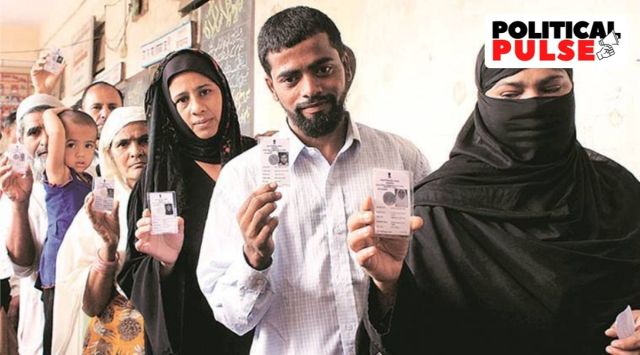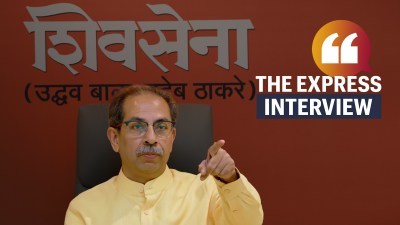- India
- International
As AAP right-ward tilt, riots alienate Muslims, AIMIM sees an opening in Delhi
This would be the AIMIM's first major political venture in the national capital since the 2017 civic polls, when it had contested nine seats and lost all.
 Constituting around 15% of the over two crore population of Delhi, Muslim voters till 2013 voted for the Congress in large numbers.
Constituting around 15% of the over two crore population of Delhi, Muslim voters till 2013 voted for the Congress in large numbers. After tasting success in the Maharashtra, Gujarat and Karnataka local body polls, the AIMIM (All India Majlis-e-Ittehadul Muslimeen) is planning to expand its footprint in Delhi. The outfit led by Hyderabad MP Asaduddin Owaisi has announced that it will contest around 40 seats in the coming MCD elections, with focus on those with a sizeable Muslim and Dalit population.
This would be the AIMIM’s first major political venture in the national capital since the 2017 civic polls, when it had contested nine seats and lost all.
The party has already announced candidates for two seats – Sitara Mohammad Fakhruddin from Brijpuri ward in Mustafabad and Sartaj Ali Saifi from Shri Ram Colony ward in Karawal Nagar.
The civic body elections will be held on December 4 from 8 am to 5.30 pm and the results will be declared on December 7, the State Election Commission announced last week.
The Muslim vote in Delhi

Constituting around 15% of the over two crore population of Delhi, Muslim voters till 2013 voted for the Congress in large numbers. The rise of AAP saw a shift to the party, contributing significantly to the newcomer’s phenomenal win in 67 of 70 seats in the 2015 Assembly polls.
In the February 2020 Assembly polls, Muslims are again believed to have backed AAP. The party won 62 seats with 53.57% votes.
However, soon after, Delhi faced its worst Hindu-Muslim violence since Partition, and the community is seen to have lost trust in AAP. Admits an AAP Councillor from North MCD, who did not wished to be named: “The party remaining mostly silent after the Delhi riots has not gone down well with Muslims.”
The community has also watched warily as AAP makes a pronounced tilt towards right-of-centre politics – it supported abrogation of Article 370 in Jammu and Kashmir, has started much-publicised teerth yatras to Ayodhya, and organised large-scale celebration of Hindu festivals like Ganpati and Diwali.
It is this sense of alienation among Muslims that the AIMIM, which claims to speak for the community, hopes to tap into.
Muslims comprise a large number in many municipal wards across Delhi and can influence results in around 35, where they are more than 30% of the population. Out of these, in 20 wards, they number more than 50%, including Okhla in South; Ballimaran, Chandni Chowk, Matia Mahal and Sadar Bazar in North; and Babarpur, Seelampur, Karawal Nagar, Mustafabad and Seeampuri in East.
AIMIM Delhi president Kaleemul Hafeez, a businessman who has been associated with the Congress and AAP in the past, says the parties use voters for their gains. “One party spreads the fear that saffron forces would eat you up if you do not support us. On the other side are saffron forces saying we will save Hindus. Like this, both sides treat us like captive voters.”
AAP, however, says it is not worried. Saying the AIMIM was no challenger, AAP MCD in-charge Durgesh Pathak says, “They have fought earlier also, they are nowhere in Delhi.”
The AAP Councillor quoted above also says: “Muslim youths talk very fondly about the AIMIM and Owaisi, but it does not necessarily mean they would vote for it.”
A senior BJP leader says another reason the AIMIM won’t get support is that it is seen by Muslims as a “vote cutter”. “After Bihar, they have mostly been unsuccessful, including in West Bengal,” he says.
 AIMIM leaders in Abul Fazal Enclave in Delhi.
AIMIM leaders in Abul Fazal Enclave in Delhi.
The AIMIM platform
Hafeez says that in 2017, the AIMIM did not have an organisation and took the decision to contest at the last moment, accounting for its poor performance. This time, the AIMIM took the call back in March 2020 and has 5,000 cadres trained and ready on the ground, the party state chief said.
Hafeez says the ground reality in Delhi has also changed after the February 2020 riots. “AAP was supported by over 80% of the Muslims in the Assembly polls, if not the Lok Sabha. But the way it failed to help us in times of distress is for all to see.”
While he agrees that police do not come under the Delhi government, Hafeez says, what about its MLAs? “They could have come out of their homes during the riots.”
The AIMIM leader also says that while the AAP government keeps talking about its development initiatives, Muslim and Dalit areas lag on all indicators, whether health, education or sanitation. “We want to change this.”
Religious polarisation and local polls
While MCD polls are largely held over hyper-local issues, during the February 2021 bypoll in the Muslim-dominated Chauhan Banger ward in Northeast Delhi, which was witness to the riots, the issue of the Tablighi Jamaat gathering that had been targeted for being a coronavirus “superspreader” event, was at the forefront. The Congress local leader, Chaudhary Zubair Ahmad, had defeated AAP’s Mohd Ishraq Khan by over 10,000 votes in the bypoll.
AAP losing the seat held by it, and the margin of the Congress win, indicated that both the riots and the Tablighi issue polarised voters.
However, AAP had won the four other seats, with the BJP the runner-up, indicating that the Chauhan Bangar win didn’t mean revival of the Congress’s fortunes.
 AAP Councillor from North MCD, who did not wished to be named said: “The party remaining mostly silent after the Delhi riots has not gone down well with Muslims.”
AAP Councillor from North MCD, who did not wished to be named said: “The party remaining mostly silent after the Delhi riots has not gone down well with Muslims.”
Space for new political parties in Delhi
While AAP may have shown the way for new political parties in the Capital, other outsiders which have tried their luck – the Maharashtra-based Shiv Sena, Bihar’s JD(U) and RJD, Uttar Pradesh’s Samajwadi Party, and Yogendra Yadav-led Swaraj India – have met no success.
The only parties that have managed to make their presence felt to some extent are Mayawati’s Bahujan Samaj Party and Punjab’s Shiromani Akali Dal, among the Dalit and Punjabi electorate respectively.
Dalits make up roughly 15% of the Capital’s population. Though they are not known to vote as a group, the BSP has managed to strike a chord. It contested for the first time in 1989. In the 2007 MCD polls, it won 17 seats; in 2012, 15; and it had three in the present municipal corporation, Kondli, Seelampur and Bawana.
The Akali Dal holds four seats currently, but these were won in partnership with former ally BJP.
A former South MCD mayor says it would be too early to rule out the AIMIM. “While it does not have either the organisation or support to make any drastic changes, if it goes with the BSP, it can create upsets in many seats.”
Apr 20: Latest News
- 01
- 02
- 03
- 04
- 05





























